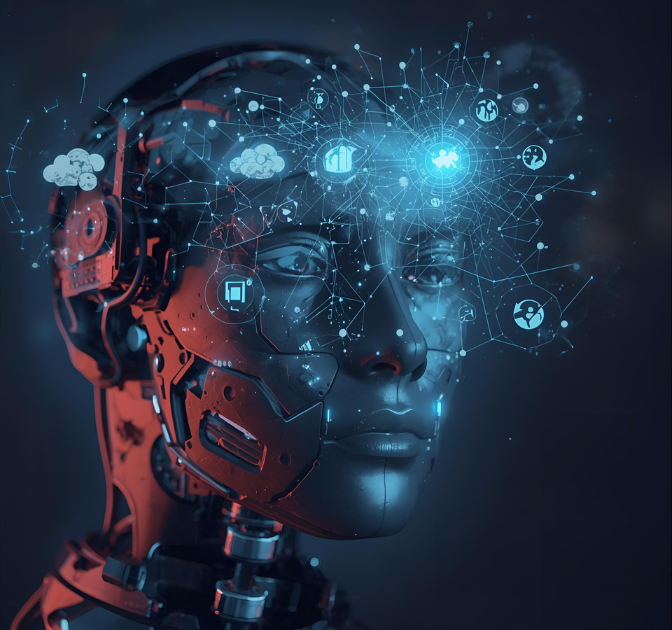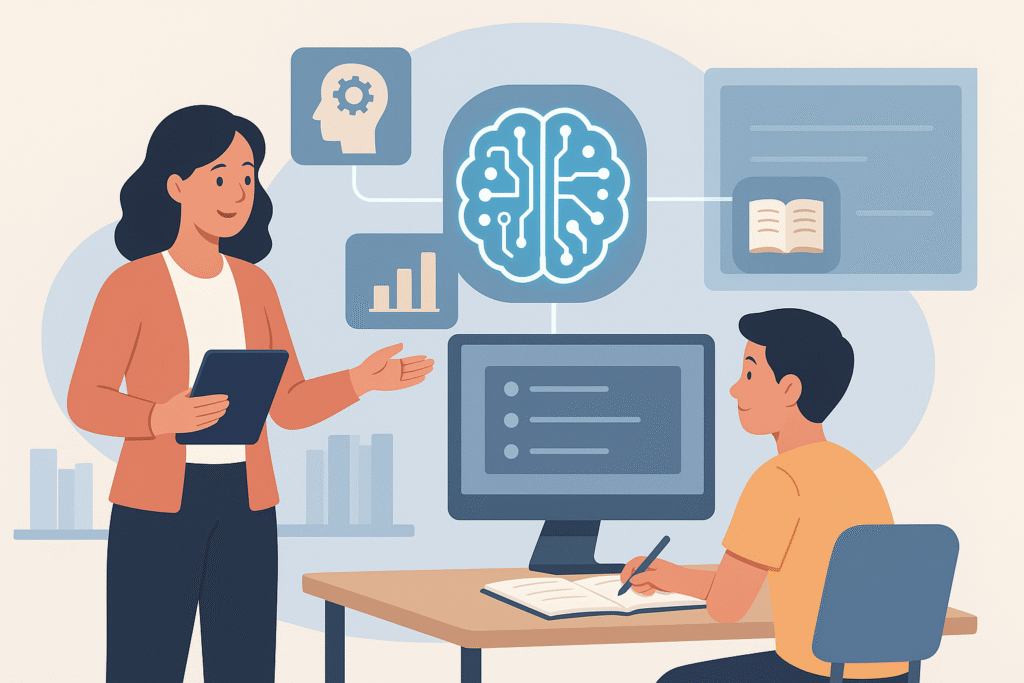Artificial Intelligence (AI) has revolutionised various industries, and the education sector is no exception. As technology continues to evolve, AI is becoming an integral part of how students learn, and how educators teach. The incorporation of AI tools in education has made it easier for learners to access personalised resources and for teachers to assess progress effectively.

In this post, we will explore the top 10 AI education tools that can transform learning experiences.
1. Introduction to AI in Education
AI in education is not just about replacing teachers but enhancing the learning experience. The role of AI education tools is to provide personalised learning experiences, improve learning efficiency, and offer real-time feedback. These tools can cater to diverse learning styles and help address individual educational needs, making them an essential part of modern education. Below, we delve into some of the most useful AI education tools that are shaping the future of learning.
2. Top 10 AI Education Tools
2.1. ChatGPT for Education
ChatGPT, developed by OpenAI, has been widely used in the education sector. It offers a unique approach by generating human-like text in response to queries, which can be used for writing assistance, answering questions, or even tutoring. Students can use ChatGPT to clarify doubts and generate study notes, while educators can leverage it to create lesson plans and provide real-time answers to student queries.

Key Features:
- Interactive learning: Engages students in meaningful conversations to enhance learning.
- Personalised feedback: Helps students by answering specific questions.
- Content generation: Aids in creating study materials and assignments.
2.2. Google Classroom
Google Classroom is an AI-powered learning management system (LMS) that has made education more accessible. It allows teachers to distribute assignments, manage classwork, and communicate with students seamlessly. Through AI integration, the platform provides automated grading, feedback, and personalised learning suggestions, ensuring students receive the right level of support.
Key Features:
- Task management: Streamlines assignments and grading.
- Real-time feedback: Helps teachers track student progress.
- Personalised learning paths: AI-driven suggestions to improve student outcomes.
2.3. Grammarly
Grammarly, although traditionally known as a grammar-checking tool, is now an AI-powered writing assistant. It helps students and professionals alike to improve their writing skills by providing detailed feedback on grammar, spelling, and sentence structure. For education purposes, it acts as an AI study guide, improving writing proficiency, which is essential in academic performance.
Key Features:
- Grammar and spell check: Automatically detects errors.
- Plagiarism checker: Ensures originality in academic work.
- Writing style improvement: Provides suggestions for clearer and more effective communication.
2.4. Quizlet
Quizlet is one of the best AI tools for learning and development. It uses machine learning to help students study more efficiently by creating personalised quizzes and flashcards. The platform can adapt to the learner’s progress, reinforcing areas that require more attention, ensuring an effective revision process.
Key Features:
- Customisable study sets: Students can create their own learning materials.
- Gamified learning: Makes studying more engaging and fun.
- AI-powered learning paths: Adapts content based on student performance.
2.5. Khan Academy
Khan Academy is another renowned educational platform that employs AI to provide a personalised learning experience. It offers interactive lessons in various subjects, with real-time data tracking students’ progress. AI algorithms suggest lessons and exercises based on the learner’s proficiency level.
Key Features:

- Personalised learning dashboard: Tracks progress and recommends next steps.
- Wide variety of subjects: Covers everything from maths to history.
- Free access: All content is available for free to anyone worldwide.
2.6. Squirrel AI
Squirrel AI is an AI-powered adaptive learning platform specifically designed for K-12 students. It uses artificial intelligence to diagnose the student’s learning ability and provides tailored lessons.

By focusing on students’ individual learning needs, Squirrel AI helps bridge gaps in knowledge and improve overall academic performance.
Key Features:
- Adaptive learning system: Customises lessons based on individual learning needs.
- Data-driven insights: Tracks student progress to optimise learning paths.
- Engaging interface: Makes learning more interactive and enjoyable.
2.7. Coursera
Coursera is an online learning platform that has incorporated AI into its offerings. AI-driven recommendations suggest courses based on students’ learning history and preferences. With its vast array of subjects, Coursera offers certificates and specialisations from top universities, making it one of the best AI tools for higher education.
Key Features:
- Personalised course recommendations: AI suggests courses based on past interactions.
- Collaboration with top universities: Offers accredited courses and certificates.
- Career development: Provides courses that enhance job-ready skills.
2.8. IBM Watson Education
IBM Watson Education is a sophisticated AI-driven tool designed to improve student learning experiences. By leveraging AI technology, Watson can provide insights into a student’s learning style and suggest personalised learning content.

It also helps teachers manage their classrooms more efficiently and assess student progress.
Key Features:
- Data-driven insights: Provides teachers with detailed reports on student performance.
- Personalised recommendations: Tailors content to individual student needs.
- Classroom management tools: Simplifies administrative tasks for educators.
2.9. Edmentum
Edmentum offers AI-driven learning tools designed to assist educators in improving student outcomes. By using predictive analytics, Edmentum customises lessons and assessments for each student. The platform also allows teachers to track individual progress and adjust learning paths accordingly.
Key Features:
- Customisable assessments: Offers tailored tests based on student proficiency.
- Learning analytics: Provides insights into students’ learning patterns.
- Comprehensive subject coverage: Focuses on K-12 education.
2.10. AI-Powered Study Tools (Studyblue, Anki)
Studyblue and Anki are two AI-powered study tools that use machine learning algorithms to enhance learning through flashcards. These platforms adapt to the user’s progress, ensuring that review sessions focus on areas that need the most attention. They are highly effective for memorisation and revision.
Key Features:
- Custom flashcards: Students can create and share their own study material.
- AI-based learning reinforcement: Adapts to user performance for optimal studying.
- Cross-platform access: Available on both mobile and desktop.
3. How AI Tools Support Different Learning Needs
AI education tools provide a broad range of benefits for learners, whether they are studying independently or in a classroom environment. Here, we look at how these tools support different aspects of learning.

3.1. Personalised Learning
One of the most significant advantages of AI in education is its ability to personalise learning. Tools like Squirrel AI and Khan Academy offer tailored learning paths that cater to individual strengths and weaknesses. Personalised learning enables students to learn at their own pace, making education more effective.
3.2. Time-Saving for Teachers
Teachers benefit from AI by automating administrative tasks such as grading and class management. Tools like Google Classroom and IBM Watson Education streamline the grading process, allowing educators to focus more on teaching and student interaction.
3.3. Improved Study Habits
AI-powered study tools like Quizlet and Anki encourage active learning and repetition, which helps students retain information more effectively. By tracking progress and focusing on areas that need improvement, these tools enhance the study experience.
4. Conclusion
The integration of AI into education has proven to be a game-changer, offering innovative tools that cater to the diverse needs of both students and educators. From personalised learning experiences to time-saving administrative tools, AI is reshaping the educational landscape. The top 10 AI education tools mentioned in this post are just the beginning, and the future of education looks even more promising with the continuous development of AI technologies.
As educators and students embrace these technologies, they will continue to enhance the way we learn and teach, making education more accessible, personalised, and efficient.
Call to Action
If you found this post helpful, don’t forget to share it with friends and colleagues. Explore more content on AI in education and how it can transform your learning experience. Feel free to comment below with any questions or your experiences with AI education tools!
FAQs
1. What are AI education tools?
AI education tools are platforms that use artificial intelligence to enhance learning experiences. These tools offer personalised learning, instant feedback, and help educators manage classrooms more efficiently.
2. How can AI improve student learning?
AI can improve student learning by providing tailored educational content, tracking progress, offering personalised feedback, and making study materials more interactive.
3. Are AI education tools free to use?
Some AI education tools like Khan Academy are free, while others like Coursera offer paid certifications. Many platforms also offer freemium models with premium features available for a fee.
4. How does AI personalise learning?
AI personalises learning by adapting to each student’s learning pace, identifying strengths and weaknesses, and recommending tailored study materials or exercises.
5. Can AI replace teachers?
AI is not meant to replace teachers but to support them by automating administrative tasks and offering personalised learning experiences for students.
6. How can AI help teachers?
AI can help teachers by providing data-driven insights into student performance, automating grading, and offering tools for creating personalised learning content.
7. What is the future of AI in education?
The future of AI in education looks promising, with ongoing advancements making learning more personalised, interactive, and efficient. AI will continue to evolve, further enhancing both teaching and learning experiences.
For further insights, explore our Digital Marketing Services, Web Development Services, and App Development Services for more information on integrating technology into educational practices.
